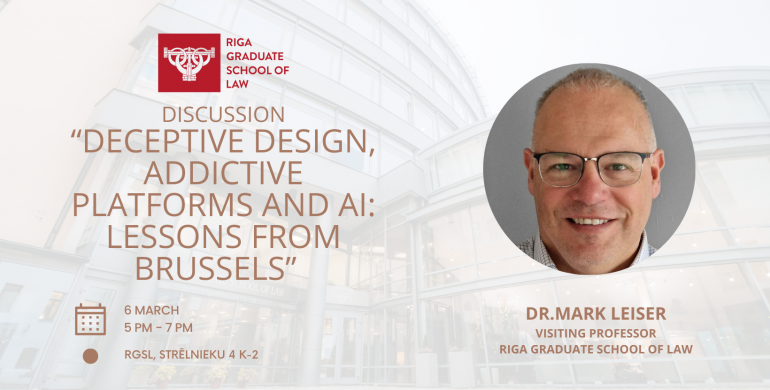We are happy to invite you to the talk and discussion on deceptive design, addictive platforms and AI by RGSL Visiting Professor Dr. Mark Leiser on 6 March at 17.00.
The discussion titled “Deceptive Design, Addictive Platforms and AI: Lessons from Brussels” will occur at RGSL Campus on Strēlnieku 4 k-2.
Register for the event here:
Dr. Leiser is one of the key faculty members at Riga Graduate School of Law Technology Law Masters programme and teaches Digital Regulation and Disruptive Technology courses. He is a regulatory theorist, specialising in Digital, Legal, and Platform Regulation. Dr. Leiser's research and lecturing focus on law and digital technologies, such as fundamental rights, e-commerce, regulatory theory, and platform regulation. contracting, security, privacy, freedom of speech, cybercrime; and phenomena related to deceptive design, dark patterns, consumer protection, and the use and regulation of AI and digital technologies. He has presented his findings to the UN, the EU Parliament, the Council of Europe, and various regulators.
On 6 March, Dr. Leiser's presentation will delve into the long-established tactics of big and AdTech companies that exploit human irrationality in decision-making through their platform and app designs. It emphasises the widespread use of deceptive design techniques, commonly referred to as dark patterns. These methods subtly coerce users into actions against their interests, such as agreeing to unfavourable terms and conditions or consenting to processing their personal data.
The presentation highlights that while traditional regulatory measures, including GDPR, Digital Services Act, and Digital Markets Act, have primarily addressed these practices at the online interface level, there is a growing realisation that many manipulative strategies are rooted deeper in the system architecture. With the emergence of AI, capable of deriving more comprehensive user insights, Dr Leiser discusses several initiatives aimed at countering such manipulative designs, including the New Deal for Consumers, the Consumer Protection Pledge, the Proposal to End Addictive Design, and Article 5 of the newly proposed AI Act. These developments suggest that Brussels might now be equipped with the necessary tools to effectively challenge Big Tech, aiming to create a healthier information ecosystem and a more trustworthy e-commerce landscape.
Dr Leiser's presentation concludes by questioning whether these new measures will be successful in reining in the manipulative practices of Big Tech and what the industry might expect going forward.
Register for the event here:

